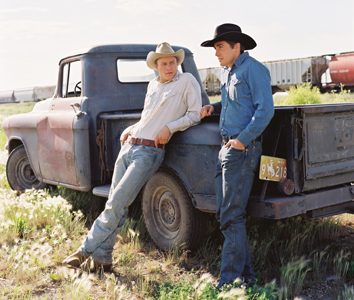 Heath Ledger and Jake Gyllenhaal find love in the wilds of Wyoming in ‘Brokeback Mountain.’
Heath Ledger and Jake Gyllenhaal find love in the wilds of Wyoming in ‘Brokeback Mountain.’
|
| Brokeback Mountain\r\nStarring Jake Gyllenhaal and Heath Ledger. Directed by Ang Lee. Written by Larry McMurtry and Diana Ossana, based on E. Annie Proulx’s short story. Rated R. |
|
A D V E R T I S E M E N T
|
|
|
|
A D V E R T I S E M E N T
|
|
Love in the Western World
Whatever your reason for seeing it, Brokeback Mountain deserves the hype.
By KRISTIAN LIN
Okay, here it is: the “gay cowboy” movie we’ve been hearing so much about, accompanied by a heap of tiresome speculation about its box-office performance and whether America is “ready” for it, not to mention a lot of nervous and self-defensive jokes by comics on late-night tv. I’m guessing a number of straight guys will go to see Brokeback Mountain only because it’s racking up rave reviews and awards and because they’re afraid it’ll make them bigots if they don’t see it. You know what? If heterosexual guilt is the only reason why you see the film, then personally I’m all for it. For something this good, any excuse will do. (Speaking of which, some straight women of my acquaintance are going to see the movie because the stars are pretty boys. Given how many straight guys have rented DVDs based on the prospect of girl-on-girl action, this is only fair.)
Based on a short story by E. Annie Proulx, the film begins in 1962 in Wyoming, where Ennis Del Mar (Heath Ledger) and Jack Twist (Jake Gyllenhaal) are both hired by the same rancher to keep an eye on his sheep grazing on Brokeback Mountain. With long days on the mountain and only each other for company, the friendly and easygoing Jack manages to draw out the introverted and temperamental Ennis, and their friendship leads to a night of drunken sex and then to a more emotional attachment. Neither of the cowboys considers himself “queer,” and when the job is over they return to the heterosexual lives they were leading before, eventually both landing in troubled marriages. Over the next two decades, they keep returning to the mountain for a few weeks of happiness together. Jack even suggests that they get their own ranch, but Ennis is too scared — not without reason — to take that step.
Beyond its subject matter, the most eye-catching aspect of this movie is its acting. Ledger’s heavily stylized, mumbly performance is piling up most of the accolades, and he is excellent here, but let’s not lose sight of how good Gyllenhaal is. Jack is less complicated and more comfortable with himself (and thus a less showy character than Ennis), but Gyllenhaal displays the accumulation of pain and frustration that eats away at Jack with all the years of being denied Ennis’ love. The quality of the acting extends all the way down the cast, to Anne Hathaway as Jack’s wife, who in a scene at the end manages the sort of frozen hauteur that only pissed-off patrician Texas housewives seem capable of, and to Anna Faris, who turns up late in the movie as a big-haired, compulsive-talking Texas socialite and is once again helplessly funny.
Another spectacular turn comes from Michelle Williams as Ennis’ wife Alma, who early in the film discovers the truth about her husband and Jack and keeps it to herself. The subsequent exchanges between Ledger and Williams perfectly capture the horrible tension and mistrust pervading this marriage, and they include a sex scene in which three lines of dialogue totally kill the vibe, as well as a climactic scene after they’ve divorced, when Alma confronts Ennis with everything she knows. I love the fear in Williams’ eyes during this last one; Alma’s afraid that her ex will punch her in the face, which he comes close to doing, but she’s also afraid to give a name to Ennis’ love for Jack.
The movie could have done with a more traditional three-hankie catharsis, but director Ang Lee has never been about that. Instead, he’s about control and understatement, even when he’s making a whirling dervish like Crouching Tiger, Hidden Dragon, and here his mastery is in every frame. The gorgeous shots of the Wyoming countryside (by cinematographer Rodrigo Prieto) act as a visual extension of Ennis and Jack’s idyllic love. His lean, sparse direction is nicely complemented by the script by Western giant Larry McMurtry and writing partner Diana Ossana. Lee has always had the ability to draw devastating power from tiny story details, and he does so here near the end, when Ennis finds one of his shirts tucked away in Jack’s closet. This Taiwanese filmmaker knows America well enough to know what game he’s playing — when he shows Ennis silhouetted against a night sky lit up by Fourth of July fireworks, he’s turning the cowboy icon on its head while reaffirming it.
Yet Brokeback Mountain isn’t about this so much as it’s a simple story about two people in love who are torn apart by a world that won’t let them be together. We’ve seen movies like this before, in Kimberly Peirce’s Boys Don’t Cry and Todd Haynes’ Far From Heaven. That this film deserves to be mentioned alongside those very different entries is a testament to the quality of this restrained, unpretentious, and in the end deeply moving Western.
 Email this Article...
Email this Article...

